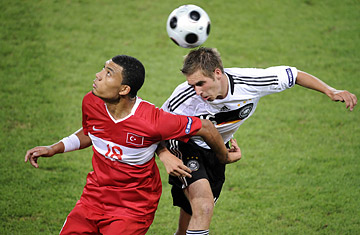
Turkish midfielder Kazim Kazim (L) fights for the ball with German defender Philipp Lahm during the Euro 2008 Championship's semifinal football match on June 25, 2008, at St. Jakob-Park stadium in Basel, Switzerland.
The horns started sounding in the streets of Berlin eight hours before the opening whistle blew. For the better part of a week, German black, red and gold flags sprouted from car windows, clothes lines, window sills right across Germany. In Berlin, the schnell-bahn rapid transit line was taken over by chanting fans, draped in national colors, swigging half-liter bottles of beer and singing for their team's victory. A half a million Berliners converged on the Brandenburg Gate in the historic center of the old capital to watch the game on giant screens. As in 2006, when Berlin hosted soccer's World Cup, a country not given to displays of national pride (since the Second World War) allowed itself to feel good about being German.
The semi-final of the European Championship, the third biggest sporting event in the world after the Olympics and World Cup, presented special complications, though. Germany played Turkey, which also happens to be the fatherland of Germany's largest minority, a 2.5 million strong community descended from gastarbeiter who were invited to what was then West Germany from Turkey as laborers in the 1960s. For Wednesday night's game, Turkish fans gathered across Germany in neighborhoods like Berlin's Kreuzberg to wave the crimson flag (Turkey itself was awash in red) and root for their team. The Turkish President, Abdullah Gul, traveled to Basel for the game, sitting a seat away from the German Chancellor, Angela Merkel, both heads of state grinning happily when their team scored and theatrically remonstrating with the referee on disputed calls.
Many Germans had regretted Turkey's success reaching the tournament's semifinals, its first ever, fearing that the contest could lead to clashes between the communities in a country not known for its ability to integrate ethnic minorities. (In a recent poll, nearly 40% of young Turks living in Germany, including many who were born in the country, said they would like to move to Turkey, even if they had never actually lived there, citing an atmosphere of intolerance toward Muslims.) Fears that the game would lead to unrest grew when some cars flying Turkish flags had their tires slashed. That did not dampen Turkish enthusiasm. As the game went on, the Turks, despite their inferior numbers, were outshouting their German brothers, at least on the streets of Berlin, chanting "Red and White, Red and White, Turkey! Turkey!"
In the event, though, Germany's last-minute win in the first match between the countries in a major tournament in 50 years was also a victory for those who see sport as a relief from politics. The game outstripped expectations but not for what happened off the field. Turkey, which took the field without eight of its first-choice players, who were forced to miss the game due to injury or suspension for previous yellow cards, managed an inspired performance that laid bare the weakness in Germany's defense while Germany belied a lackluster performance for much of the game by capitalizing brilliantly on a few chances. Both teams came from behind before Germany finally put the game away with a bold strike in the 90th minute. The team will now face either Russia or Spain in the final in Vienna.
"It was a beautiful and exciting game for Germany and for the Turks who live here with us," Chancellor Merkel, an avid soccer fan, said after the game. She added: "The Turks played a good game and one has to compliment them for that. But I am especially glad that we won!" Turkey, which is facing a political crisis over the attempt by the secularist courts to ban the ruling party allegedly for flirting with political Islam, put aside controversies to pull together to cheer the home team.
The drama of the game got a boost when powerful electrical storms knocked out broadcasts for more than six minutes during the second half across most of Central Europe. In Berlin, fans at a Kreuzberg beer garden where both Turks and Germans had gathered to watch the game on an outdoor screen huddled around their mobile phones to follow the game on the tiny radios.
As the city got ready to party all night, cars converged on Kreuzberg waving both Turkish and German flags, chanting through megaphones. A convoy of Turkish cars waved a giant Turkish flag and a smaller German one. Tayfun Kaleci, a young, well-built fan outside an all-night Turkish bakery grinned at a parade of noisily honking cars cruising by after midnight. Turkey was the better team, he says. But in the final, he knows he'll be rooting for Germany — "Definitely!"
—With reporting by Olga von Schubert/Kreuzberg